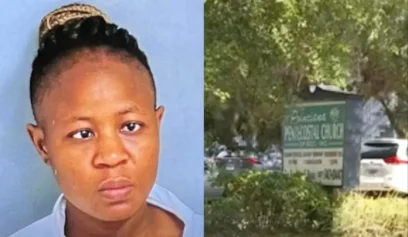The man who invented the Afro pick, a revolutionary hair-styling product for kinky hair, has died. A barber and hair stylist by trade, Willie Morrow, according to his family, was a powerful community stakeholder, who believed “you should not have to go out of your own community for the resources and wealth.”
On Wednesday, June 22, Morrow, the visionary behind the pick comb, chemist and author, transitioned at the age of 82 in San Diego, California. The entrepreneur was blessed to spend his last moments surrounded by family, the Los Angeles Times reported.
Many know that Morrow made his fortune as an inventor, revolutionizing hair care with the Afro pick. However, few are aware that he also created the California curl style, a curly perm that preceded the Jheri Curl.
He also had the first utility patented Eze-Teze hair styling comb and the first blow dryer attachment comb.
As a barber, he was able to use his influence in the Black and brown community to popularize both the tool and the style.
His daughter Cheryl Morrow revealed in an interview just how community-minded Morrow was.
“He just believed in community being the source of the economy,” she said. “That you should not have to go out of your own community for the resources and wealth that you needed. It should be in your community.”
She says her dad schooled her by saying, “We are the boot. We didn’t need straps, just as long as they fit, I’m walking.”
After his demise, Shane Harris, the founder of the People’s Association of Justice Advocates, said Morrow gave Black people “the tools they needed to do their hair the way they wanted to do it. But he also worked hard to change the perception in America of natural Black hair being something that was not ‘neat’ or ‘professional.’ ”
State Assemblymember Akilah Weber (D-San Diego) wrote in an email that Morrow was the “embodiment of the promise of America.”
Weber said in his eulogy, “He grew up in the south to a family of sharecroppers and through hard work and his own ingenuity, built a multi-million-dollar haircare business and media empire. He embraced his community and became the protector of rare and priceless Black art and artifacts.”
The community leader continued to tout his commitment to the success of those around him, saying, “He opened his doors to young entrepreneurs and shared the invaluable lessons not only of achieving success but of starting over and rebuilding from scratch. He will be remembered for his many inventions and connection to the curl phenomenon and for his devotion to family.”
This son of Alabama sharecroppers born in 1939, through his industrious nature, stepped out of hair care into a realm that placed him in media where he owned and managed, from 1977 to 1990, the radio station, XHRM and the San Diego Monitor-News.
When he left Tuscaloosa, Alabama, in 1959, during the height of Jim Crow, he decided to go to California for a new life.
Cheryl Morrow recounted her father’s journey as an 18-year-old, saying he arrived in San Diego on a Greyhound bus with a paper bag lunch of fried chicken and pound cake and a suitcase with one suit and a shirt.
He understood that he would still encounter racism, almost 2,000 miles away, but he had a plan.
“My dad took advantage of the fact that San Diego had been dubbed the Mississippi of the West. For my father, it was about economics,” she revealed. “That’s how he dealt with racism.”
She added, “My dad said racism in San Diego afforded him to be the best barber in the city, the state, the country, then the world. Racism afforded him the opportunity to zero in on what his people needed. He did not fight with a fist, he created things; it was his way of dealing with racism through economics.”
She recalled him once telling her, “ ‘My job was to be so good, and so awesome, I would become racism proof.’ ”
Cheryl Morrow told The San Diego Union-Tribune for many Black people from the South, like her dad, “San Diego became home because of military service and jobs.”
According to the daughter, who is now the CEO of California Curl, her dad told her he came to the city because of its reputation.
He said to his daughter, “ ‘I was excited to try my ideas and vision in a city I had read was the Harlem of the West.’ ”
She continued, “My father saw an opportunity to flourish by supplying the beauty needs of African American military personnel as well as civilians. He turned a Black hair care company into a tech-design industrial giant.”
In the 1970s, the U.S. Department of Defense hired Morrow on military bases to teach barbering classes and to provide hair services to those soldiers stationed in the Southern California city.
After he worked for the military, he started another career writing books on hair care and cutting. Some of those titles are as follows: “Curly Hair: A Specialized Text on Styling the Natural Afro and Straight Hair” and “400 Years Without a Comb: The Untold Story.”
While living in San Diego, Morrow met Gloria, the woman who would become his wife of 56 years and the mother of his two daughters.
“Thank you, San Diego, for giving an Alabama boy the reality of dreams fulfilled,” Cheryl stated. “Willie L. Morrow, a man whose life needed neither introduction nor exit. The great San Diego craftsman left pieces of himself with his beloved community, memories in the repositories of people’s hearts.”


